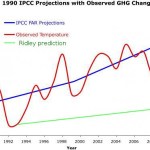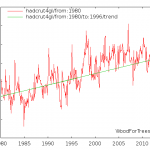The War on Science
Matt Ridley, in The Globe and Mail, 31 Dec 1993.
Global warming, too, has shot its bolt, now that the scientific consensus has settled down on about a degree of temperature increase over a century-that is, little more than has taken place in the past century.
Actually, the scientific consensus at the time, as summarised by the IPCC was for an increase about three times that. We can compare how the IPCC and Ridley’s projection fared over the next two decades:
(Graph modified from Skeptical Science)
Given how wrong his prediction was so far, Ridley reconsidered his beliefs. Ha ha…
Maurice Newman, former chairman of the Australian Broadcasting Corporation, has the necessary lack of scientific qualifications to write about climate science in The Australian (Google “Losing their religion as evidence cools off”):
So when in 1969 Paul Ehrlich claimed because of global cooling it was an even-money bet whether England would survive until the year 2000, he could not immediately be proven wrong. After all, this was a cooling period.
Newman is just making things up here. Ehrlich did say that there was a 50% chance of England’s collapse by 2000, but not because of global…
Graham Lloyd is back with a story headlined “Climate link to Sandy invalid” (Google the title if you want to read it). As we've come to expect from The Australian the headline is contradicted by the story, with both scientists quoted agreeing that sea level rise caused by global warming had worsened the flooding from Sandy. Lloyd writes (all links in quotes added by me):
In a statement on the disaster that hit North America on Monday, the federal government-sponsored Climate Commission said "all the evidence suggests that climate change exacerbated the severity of Hurricane Sandy…
Nick Ross writes:
The Australian's technology coverage (in print) is a mixed bag in that it has some of the very best technology writers in the country but their section's reputation gets tainted by almost-incessant, poisonous beat-ups of the National Broadband Network coming from elsewhere on the masthead. These have done it few favours in the regards of Australia's technology community.
In other words, it's just like their coverage of climate science and renewable energy.
Michael Asten continues The Australian's war on science. In his latest piece (Google "Science hijacked at school level") Asten complains that secondary science education is not paying attention to the views of Ian Plimer on climate change.
Perusal of the resources for secondary school physics students provided by the Australian Institute of Physics (Vic) Education Committee suggests some of our science educators have indeed lost the ability to teach objective and open-minded scientific inquiry.
Web resources relating to climate science provided by this committee contain at least three…
Whenever we had bean salad, my Dad would always ask "What's that?" When told what it was, he would say "Don't tell me what it's been, tell me what it is now!" That's a Dad joke. The defining properties of a Dad joke are that it is not funny and that Dad keeps repeating it. In their ongoing war on science The Australian is now committing war crimes by deploying Dad jokes (which I recall were banned by the Geneva Convention in 1949).
Imre Salusinszky, who declared global warming to be dead in January of last year has repeated the same unfunny joke this January:
Last year, other parts of the…
The Australian has continued its war on science by printing an extract from Ian Plimer's new book, How to Get Expelled from School. The extract is largely plagiarised from this press release on a recent paper in Science by Funder et al finding large fluctuations in Arctic sea ice over the last 10,000 years. Plimer did change this passage in the press release
In order to reach their surprising conclusions, Funder and the rest of the team organised several expeditions to Peary Land in northern Greenland.
to this:
In order to reach their unsurprising conclusions, Funder and the rest of the…
The IPCC Special Report on Managing the Risks of Extreme Events and
Disasters to Advance Climate Change
Adaptation (SREX) found:
Regarding the future, the assessment concludes that it is virtually certain that on a global scale hot
days become even hotter and occur more often. "For the high emissions scenario, it is likely that
the frequency of hot days will increase by a factor of 10 in most regions of the world", said Thomas
Stocker the other Co-chair of Working Group I. "Likewise, heavy precipitation will occur more often,
and the wind speed of tropical cyclones will increase while their…
In an interview in The Australian (behind The Australian's paywall, search for "Gadfly Geoffrey Blainey") historian Geoffrey Blainey gets his history wrong:
In 1970 the overwhelming majority of scientists believed that there was not going to be global warming over the next 40 years.
That's not true, as Ian Musgrave explains.
In a piece ironically titled "Be prudent with climate claims" (behind The Australian's paywall, search for the title if you want to read it) George Pell declares that, unlike him,
"many politicians have never investigated the primary evidence."
However, if you look at the sources he cites, you'll find that by "primary evidence" he means claims made by Monckton and Plimer, not peer-reviewed work by climate scientists. He only manages one cite to the IPCC reports and that is just to quote an out of context sentence to make it look like the IPCC as saying that climate is no more predictable…
Stop me if you've heard this before -- The Australian has published a story with a picture of a bloke standing on a beach to prove that sea levels aren't rising. Mitchell Nadin tells us:
At 73, former CSIRO engineer Denis Whitnall has seen many things -- but rising sea levels isn't one of them.
Looking out over the Pacific Ocean from the back of his waterfront property at Avoca, on the NSW central coast, Mr Whitnall shakes his head as he talks about a grim report commissioned by his local council in 1995 that predicted some houses along the beachfront, including his own, would be subject to…
Robert Manne's Quarterly Essay is 40,000 words on the malign influence of The Australian on public affairs in this country. You can read an extract here and watch an interview with Manne here. Also of interest is commentary on Manne's essay from Tim Dunlop who asks "why anybody continues to take The Australian seriously" and Margaret Simmons, who writes, "Manne's most powerful accusation against The Australian is lack of intellectual honesty".
Manne presents several case studies of The Australian's bias and bullying and their war on science (with an acknowledgment to my blog) is one of them…
I have an article in The Conversation on the misrepresentation of the science on sea level in news stories in The Australian:
In August The Australian had a story by Ean Higgins on Tim Flannery's waterfront home.
Higgins' message was the fact that Flannery had a house near the water showed he was insincere in his warnings about sea level rise. The article also suggested Flannery had frightened the elderly into selling their seaside homes to him.
But the Hawkesbury River where Flannery's home stands has steeply rising banks. Waterfront homes there are several metres above sea level and are…
In The Conversation Michael Ashley writes about The Australian's War on Science, with emphasis on Michael Asten's misrepresentations of the science:
When I contacted The Australian's opinion editor late last year to express dismay at their bias, I was given the example of Michael Asten, a part-time professorial fellow in the school of geosciences at Monash University, Melbourne, as someone who was well-qualified to comment. ...
So, Asten, with no expertise in the field, is using a paper published in Nature to argue the opposite of what the paper actually says.
He then spins this as "top…
Jane Fraser, columnist in The Australian , writes a column based on "facts" she got from a chain email:
Back to Plimer. He says he knows how disheartening it is to realise all your savings on carbon emissions have been eaten up by natural disasters. You've suffered the inconvenience and expense of driving Prius hybrids, buying fabric grocery bags, sitting up 'til midnight to finish your kids' "The Green Revolution" science project, using only two squares of toilet paper, putting a brick in your toilet, selling your speedboat, holidaying at home instead of abroad, replacing all those light…
Chip Le Grand, Victorian editor of The Australian, complains that Stuart Rintoul was victimized by Media Watch. Just like Rintoul, Le Grand misrepresents Watson's paper:
[Rintoul] brought to national attention research by NSW researcher Phil Watson showing that sea levels around Australia over the past 100 years haven't risen as quickly as scientists would have expected them to as a result of global warming.
This isn't true. Watson did not compare the sea level rises with expected sea level rises as a result of global warming. As Kathleen McInnes of the CSIRO told Media Watch:
The study by…
Media Watch does an excellent report on Stuart Rintoul's misrepresentation of Phil Watson's paper.
Count the whoppers from The Australian. The Australian:
as I understand it the CSIRO was invited to comment to Media Watch and declined to do so.
Kathleen McInnnes of the CSIRO on how they weren't invited to comment:
CSIRO ... would have appreciated the opportunity to clarify what is a complex issue for many people.
The Australian:
Phil Watson ... has made no complaint about how his research was represented in the article and will not.
Watson's Department:
Mr Watson does not agree with the…
Kudos to John Quiggin, not for winning the 2011 Distinguished Fellow Award from The Economic Society of Australia (even though that's pretty impressive), but for winning the 2011 Distinguished glass jaw punching award, for his posts on the "mistakes, misleading headlines and outright lies" from The Australian. His prize is this lengthy article in The Australian by Michael Stutchbury on how Quiggin is a big commie. My favourite bit is this, where Stutchbury (who is economics editor at The Australian) denies that The Australian has been conducting a campaign against climate science
On climate…
The latest volley in The Australian's ongoing war on science is extended ad hominem attack on climate scientists from Jo Nova. Nova claims that climate science is a "mess", but in 1200 words Nova doesn't make one scientific argument. Instead she argues that the scientific consensus was "purchased" by the goverment from scientists who were "paid to find a crisis".
Nova doesn't explain why the Howard government and Bush administration didn't purchase themselves a scientific consensus that climate change wasn't a problem.
She asks:
Where is the Institute of Natural Climate Forces, or the…
Phil Watson, Team Leader of the Coastal Unit in the NSW Department of Environment, Climate Change and Water was probably pleased when The Australian's Stuart Rintoul asked to interview him about his work. Watson was the man who organised A snapshot of future sea levels: photographing the king tide. The photographs of the king tide in 12 January 2009 are intended to help prepare NSW to adapt to a possible 90cm of sea level rise this century. So I'm guessing he wasn't too pleased when Rintoul's front page story about his work claimed that "Watson has written a report stating that global…

